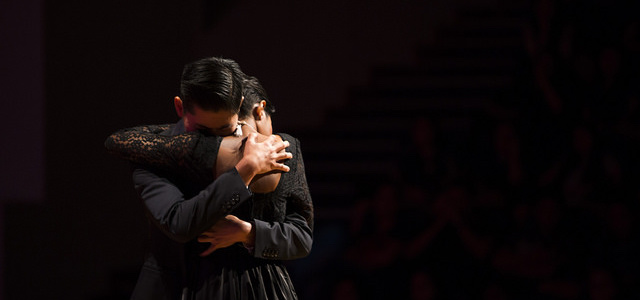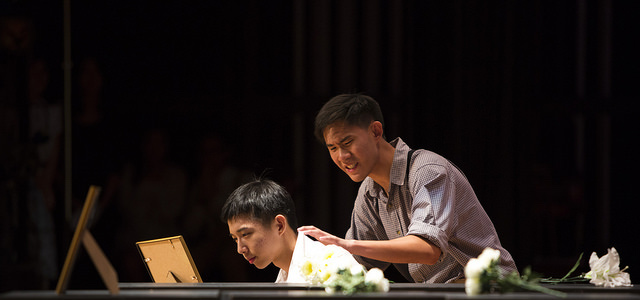‘The play presents a world of divided loyalties.’ How far do you agree with this comment on All My Sons?
Introduction
All My Sons is often criticised for presenting an ‘impatient’, didactic lesson on man’s responsibility towards his fellow men. (Context) While the title evokes a simplistic sense of cohesion and community (for all men are ‘our sons’), the play itself unfolds to waves of contradiction and conflict. (Outline) Chris’s moral ambition does not endure, stirred by the promise of happiness with Ann and the guilt of protecting his father. His idealism sets him on a collision course against both his parents, particularly his father’s undulating family-first values. These loyalties and divisions ultimately send the Keller family hurtling towards tragedy, destabilising the idea that one can simply know that ‘there’s a universe of people outside and you’re responsible to it’. (Thesis) By presenting a world of divided loyalties, the play challenges its audience to look beyond devotion to any one ‘loyalty’. It urges us to find balance, however hard it may seem.
Paragraph 2
(What) We ascertain as early as Act One that Chris’s brand of ‘Man for man’ responsibility, entrenched in a world of divided loyalties, is far from absolute. (How) The conflicting nature of Chris’s priorities is conveyed through immediate contrasts in his tone and vocabulary. (How) An undercurrent of shame is evident when he associates his father’s money with ‘loot’, which he felt ‘ashamed’ to take and ‘wrong to be alive’. He speaks resoundingly of his comrades’ selflessness and exalts ‘the love a man can have for a man’. (How) Yet, he unflinchingly promises ‘to make a fortune for’ Ann, professing that ‘I want you now’ and ‘I’m going to…’. The audience is likely to spot the shift to these self-centred declarations starting with ‘I’, and begins to doubt his credibility. (Why) Evidently, Chris Keller is constructed as a man of internal contradictions and divisions. He is less a Christ figure than he is a hesitant hero — a reminder that no man can wholly live up to the noble sacrifices… of dead men.
Paragraph 3
(What) Chris thus embodies ‘a world of divided loyalties’, more so than Ann’s self-seeking cunning and Jim’s sense of compromised idealism. His re-entrance in Act Three discloses to the audience that he is guilty of protecting his own father from the arm of justice, his split loyalties to both family and a ‘universe of people outside’ becoming even more disquieting. (How) The repetition of ‘yellow’ in his lengthy confession reflects this sense of turmoil, as he grapples with his own cowardice and deceit by doing ‘nothing’ about his father (87). (How) The self-loathing continues as bestial imagery is used to compare Chris to ‘cats’, ‘dog’ and a ‘zoo’; Chris cannot bear being torn between family and the wider community, and for that reason he can only ‘spit on myself’ in disgust (87). (How) His series of rhetorical questions reiterate this division in loyalties. Asking if and why he would ‘put (his father) behind bars’, Chris appears to acknowledge that he ‘cannot take it out on him’. Before the crucial letter sequence, Chris remains a figure divided between his fractured principles and his wretched father:
CHRIS. What? Do I raise the dead when I put him behind bars? Then what I’ll do it for? […] But here? This is the land of the great big dogs, you don’t love a man here, you eat him. […] The world’s that way, how can I take it out on him? What sense does that make? This is a zoo, a zoo! (Act Three, 88)
The same bestial images and self-loathing can be read as further evidence of Chris’s responsibility to society, as he continues to lament the loss of ‘honor’ and ‘love’ in a forsaken ‘zoo’. (Why) Yet, the play suggests that these internal divisions have taken a toll on Chris: the stage directions describe him as spent and ‘exhausted’ (86). This portrayal of Chris as a victim here provides no answers to the moral quandary, but only serves to ask the audience further questions about their own loyalties.
Paragraph 4
(What) The Keller family becomes a microcosm of these ‘loyalties’ to society and family, as dramatised in the growing tensions between Chris and Joe. (How) The divisions in ideology is foregrounded by the clash of discourse. Chris employs an idealistic tongue of community and altruism, reiterating values of ‘responsibility’, living ‘for each other’ (38) and being ‘better’ than our baser instincts (91). On the other hand, Joe speaks about the primacy of family and how ‘Nothin’ is bigger!’ (83), emphasising the father’s duty to provide (77) and more tellingly, the filial loyalty of sons and daughters (32, 77). (What) Their staunch allegiance to their own beliefs prevents them from recognising — and appreciating — each other’s. (How) Miller’s stage directions towards the end of Act Two exemplify this antipathy: Chris is ‘deadly’ and ‘unyielding’ in his demands, whilst Keller is initially ‘insistent’, and later ’horrified at his overwhelming fury’ (76). (How) These tensions culminate in an incendiary physical confrontation at the end of Act Two. They circle each other on stage like predator and prey, ‘their movements now… those of subtle pursuit and escape’ (76). Chris explodes into violent rage both verbal and physical: he threatens to ‘tear the tongue out of your mouth’ and ‘pounds down upon his father’s shoulder’, shocking an already startled audience (78). (Why) The antagonism between father and son here embodies the damage done by their incompatible belief systems.
Paragraph 5
(What) The woeful divisions within the Keller family are extended by the conflict between Chris and Kate, where the former’s idealistic aspirations collide with his mother’s pragmatic desire to preserve what is left of her family. (How) This fierce loyalty is self-evident from both her name (as the mother and ‘guardian’ of the house) and her introduction as ‘a woman of uncontrolled inspirations and an overwhelming capacity for love’ (18). (How) Yet, it is her appeal for Chris to ‘protect us’ at the start of Act Two that characterises her staunch commitment to ‘us’ over society-at-large (44). (How) Subsequently, Kate’s ‘uncontrolled’ dedication to the family is pit against Chris’s personal desires, with both employing a series of ferocious exclamations at the end of Act Two. Each refuses in absolute terms (‘now I say no!’, ‘You’ll never’, ‘I’ll never’) to give way to the other and makes their own demands (‘till I do it’, ‘You’ll never let him go!’). (Why) Mother’s attempts to force Chris away from Ann and back into her definition of ‘us’ (which includes Larry) prove futile, driving the family even further apart. The Kellers’ conflicting intentions ultimately sink them deep into the play’s tragic vision.
Paragraph 6
(What) Only in the face of catastrophe do these divided loyalties come to a standstill. (How) In the play’s final scene, Mother repeatedly begs for Chris to relent (‘Didn’t you hear? It’s over!’, ‘What more can we be!’) and forgive Joe for his moral blindness (91). This instead incites Chris’s most fervent call to be ‘better’ and to be ‘responsible’ to a whole ‘universe of people’ (91). The deadlock here, like that between Chris and Keller, leads the audience towards a similar mix of apprehension and distress. (How) A reprieve from these unbearable tensions is earned, ironically, only when ‘a shot is heard in the house’ — a tragic coda to the conflict between familial devotion and social responsibility. As a grieving mother comforts her grieving son in her ‘arms’, with tears welling but not streaming (‘almost crying’, ‘she begins sobbing’), their loyalties are momentarily put aside. (Why) In silence (‘Shhh…’), divisions fade to differences and the only loyalty left is that of family. Finally, we see mother and son stand together.
Conclusion
Bearing the weight of a father’s death and a family in mourning, the audience leaves the theatre with a heavy heart. ‘Loyalties’ have destroyed not just an individual, but also the relationships between mother and father, mother and son, father and son. The conflation of both loyalties to the play’s message — every man should be seen as All Our Sons — is compelling. However, it is a convenient truism; it is not easy to see loyalty to the family and society as one and the same. Like Kate and Joe, we ask ourselves if we can be better, and try in our own way to be a ‘Jesus in this world’ (89). Like Chris in the final scene, we wonder if our family should be our immediate priority instead… or if we will always remain divided.

 Photo: Chiew Jia Hui
Photo: Chiew Jia Hui